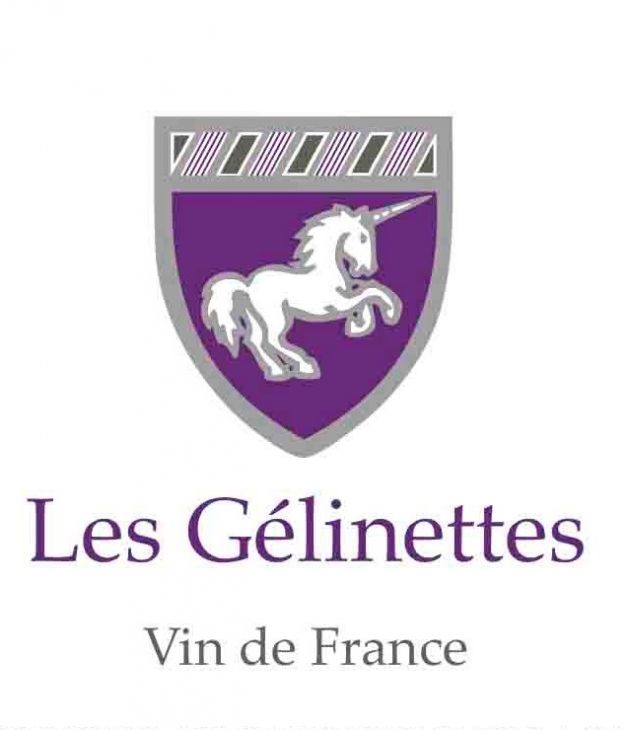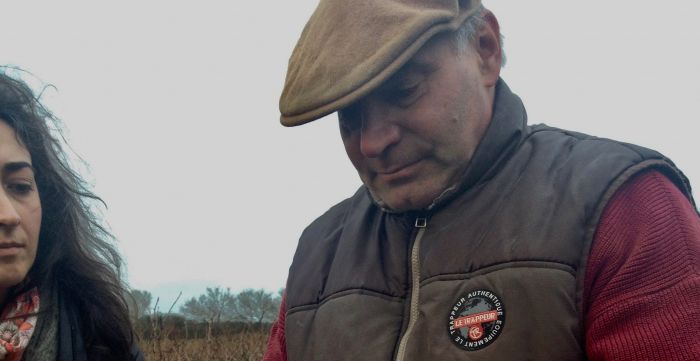
producer profile
11.07.2019
Ferme de la Sansonière Producer Profile
<p>The rather small area of the <span class="zalup"><span><glossary title="349">Coteaux-du-Layon</glossary><span>,</span></span></span> famous for its sweet wines, has proven to be fertile terrain for winemakers with strong personalities willing to flip the script. Since the original wave of Patrick Baudouin, Philippe Delesvaux, Jo Pithon and Mark Angeli in the late 1980's, to this very day the area continues to attract many brilliant and eccentric personalities, often newcomers to the area and profession. Many of the most captivating <glossary title="405">dry</glossary> white wines of the <glossary title="602">Loire Valley</glossary> now come from this sector, and Mark Angeli's tireless efforts to promote the alternative potentials of the region are largerly responsable for this. </p>
<p>Mark, a chemistry student turned stonemason who embraced <glossary title="1103">viticulture</glossary> as a form of environmental protection, is a firm believer in "<glossary title="160">biodynamie</glossary>" and in the wines that can be made from this method of culture. He bought his <glossary title="427">estate</glossary> in 1990, with seven <glossary title="523">hectares</glossary> of <span class="zalup"><span><glossary title="105">Anjou</glossary><span>,</span></span></span> <glossary title="349">Coteaux-du-Layon</glossary> and <span class="zalup"><span><glossary title="177">Bonnezeaux</glossary><span>.</span></span></span> These last two <span class="zalup"><span><glossary title="113">appellations</glossary><span>,</span></span></span> planted by law entirely in <span class="zalup"><span><glossary title="281">Chenin blanc</glossary><span>,</span></span></span> are supposed to <glossary title="1129">yield</glossary> richly sweet <glossary title="694">moëlleux</glossary> or <glossary title="598">liquoreux</glossary> wines every year. The <glossary title="">AOC</glossary> rules do not admit any <glossary title="386">demi-sec</glossary> or <glossary title="936">sec</glossary> wine, as it does in <glossary title="1121">Vouvray</glossary> and <span class="zalup"><span><glossary title="684">Montlouis</glossary><span>.</span></span></span> Anything below a <glossary title="694">moëlleux</glossary> loses the names <glossary title="349">Coteaux-du-Layon</glossary> or <span class="zalup"><span><glossary title="177">Bonnezeaux</glossary><span>,</span></span></span> has to be entirely <glossary title="936">sec</glossary> and becomes an <glossary title="105">Anjou</glossary> blanc, the lowliest of categories in the area and the least remunerative too. So, every year early in the picking season, winemakers have to gamble that the weather in September and October is going to <glossary title="324">concentrate</glossary> the grapes’ sugar through <glossary title="721">noble rot</glossary> or <span class="zalup"><span><glossary title="763">passerillage</glossary><span>,</span></span></span> and that they’ll be able to make sweet wines.<br />
<br />
After years of making celebrated <span class="zalup"><span><glossary title="177">Bonnezeaux</glossary><span>,</span></span></span> Angéli decided to reverse course and make great <glossary title="405">dry</glossary> (or <glossary title="386">semi-dry</glossary>) wines from all of his <span class="zalup"><span><glossary title="1133">plots</glossary><span>,</span></span></span> even those in <span class="zalup"><span><glossary title="177">Bonnezeaux</glossary><span>.</span></span></span> The first major step in accomplishing this was a transformation of the vinyeard sites themselves, from "classic" rows trained in <glossary term="Guyot" title="518">guyot</glossary> to <glossary term="Gobelet" title="497">gobelet</glossary> <span class="zalup"><span><glossary term="Training System" title="1039">training</glossary><span>.</span></span></span> The logic? That <glossary term="Gobelet" title="497">gobelets</glossary> liberate the <glossary term="Chenin Blanc" title="281">Chenin</glossary> vines, giving them more freedom and air, in turn leading to purer grapes and less rot. This led to the production of Sansonnière's first <glossary title="">Anjou</glossary> blanc “La Lune”, which has the deep gold color of a sweet <span class="zalup"><span><glossary title="281">Chenin</glossary><span>,</span></span></span> and notes of dried, candied fruit on the <glossary title="723">nose</glossary>; the mouth is rich, despite its <glossary title="662">minerality</glossary> and lively <glossary title="71">acidity</glossary>; the wine is totally <span class="zalup"><span><glossary title="405">dry</glossary><span>,</span></span></span> but with the weight and flavors of a <span class="zalup"><span><glossary title="694">moëlleux</glossary><span>:</span></span></span> in all, quite an astonishing feat of vinegrowing and winemaking. </p>
<p>Other<strong> <glossary title="959">single vineyard</glossary> <glossary title="363">cuvées</glossary></strong> like “Les Fourchades”, “Les Blanderies” and “Les Gelinettes” are made in tiny quantities. The wines are all <glossary term="Vinification" title="1104">vinified</glossary> <span class="zalup"><span><glossary term="Native Yeast" title="538">naturally</glossary><span>,</span></span></span> followed by long <glossary term="Elevage" title="418">elevages</glossary> in <glossary term="Old Oak" title="739">old oak</glossary> <span class="zalup"><span><glossary term="Barrel" title="142">barrels</glossary><span>.</span></span></span> Homeopathic additions of natural, <glossary term="Volcanic" title="1117">volcanic</glossary> <glossary term="Sulfites" title="993">sulfur</glossary> sourced from <glossary term="Etna" title="429">Mount Etna</glossary> are added either after <glossary term="Alcoholic Fermentation" title="87">alcoholic</glossary> and <glossary term="Malolactic Fermentation" title="622">malolactic fermentation</glossary> and/or at <span class="zalup"><span><glossary term="Bottling" title="185">bottling</glossary><span>,</span></span></span> though depending on the <glossary term="Cuvée" title="363">cuvée</glossary> and <span class="zalup"><span><glossary term="Vintage" title="1109">vintage</glossary><span>,</span></span></span> particurlarly the red <glossary term="Cuvée" title="363">cuvée</glossary> Gelinettes, <glossary term="Sulfites" title="993">S02</glossary> additions may be omitted.</p>
<p>For years Mark produced everything under the <glossary title="105">Anjou</glossary> <span class="zalup"><span><glossary title="113">appellation</glossary><span>,</span></span></span> but once his rosé (now discontinued) started getting refused by the <glossary title="537">INAO</glossary> tasting panel, he chose to <glossary title="383">declassify</glossary> it as <glossary title="1006">table wine</glossary> and redubbed it "<glossary title="876">Rosé</glossary> d'un Jour", a riff on <glossary title="871">Rosé</glossary> d'<span class="zalup"><span><glossary title="105">Anjou</glossary><span>.</span></span></span> Eventually, it was decided to abandon the <glossary title="113">appellation</glossary> and <glossary title="185">bottle</glossary> the entirety of the production as <span class="zalup"><span><glossary title="1092">Vin de France</glossary><span>.</span></span></span> </p>
<p>Mark retired a few years ago and has fully handed the reigns to his son Martial. A chip off the old block, Martial continues pushing everything to new heights: while singling out new single vineyards to <glossary term="Bottling" title="185">bottle</glossary> as their own <glossary term="Cuvée" title="363">micro-cuvées</glossary> and extending <glossary term="Elevage" title="418">élevages</glossary> a full year for a total of 24 to 36 months, he mostly devotes his time adapting to climate change's long-term effects on his vines. </p>
<p>When Angéli started focusing on <glossary term="Dry/Sec" title="405">dry</glossary> white wines in the 1990's, weather conditions were more akin to what to historical norms of the area. But as climate change increasingly began affecting the balance of the <span class="zalup"><span><glossary term="Chenin Blanc" title="281">Chenin</glossary><span>,</span></span></span> making <glossary term="Dry/Sec" title="405">dry</glossary>/<glossary term="Off-Dry" title="736">off-dry</glossary> wines actually became much HARDER, increasingly forcing Mark and Martial to resort to <glossary term="Filtration" title="447">filtration</glossary> in order ot avoid refermentation in bottle. Realising that wines with varying degrees of<glossary term="Residual Sugar" title="853"> residual sugar</glossary> each <glossary term="Vintage" title="1109">vintage</glossary> was confusing to the consumer while also unhappy with the harsh manipulation of <glossary term="Filtration" title="447">filtration</glossary> -still seen as a lesser evil than adding large amounts of <span class="zalup"><span><glossary term="Sulfites" title="993">sulfites</glossary><span>-</span></span></span> Martial initially began marking the levels of sugar on each label, but eventually decided to fundamentally change the <span class="zalup"><span><glossary term="Pruning" title="834">pruning</glossary><span>,</span></span></span> <glossary term="Harvest" title="521">picking</glossary> and <glossary term="Elevage" title="418">elevage</glossary> regiment to assure <glossary term="Fermentation" title="441">fermentations</glossary> go all the way. Since the 2021 <span class="zalup"><span><glossary term="Vintage" title="1109">vintage</glossary><span>,</span></span></span> all of the <glossary term="Estate" title="427">estate</glossary>'s wine wines are 100% <glossary term="Dry/Sec" title="405">dry</glossary> and without <span class="zalup"><span><glossary term="Filtration" title="447">filtration</glossary><span>.</span></span></span> </p>
<p>The other major issue linked to climate change is <span class="zalup"><span> <glossary term="Frost" title="1135">frost</glossary><span>:</span></span></span> as winters become milder, <glossary term="bud break" title="1495">bud break</glossary> can occur up to a full month of earlier then what had been historic norm for generations. Yet april <span class="zalup"><span> <glossary term="Frost" title="1135">frosts</glossary><span>,</span></span></span> when the temperature in the night dips to below freezing, are still common. If the <glossary term="Bud" title="206">buds</glossary> are already formed at this critical period, they will suffer ice burn and not be able to grow into <span class="zalup"><span><glossary term="Cluster/Bunch" title="1138">bunches</glossary><span>,</span></span></span> potentially decimating an entire crop in just one night. While this was never a problem in the past, since the vines' vegetation was normally still shut down, it now poses an existential threat to the sustainability of <glossary term="Viticulture" title="1103">viticulture</glossary> in <span class="zalup"><span><glossary term="Frost" title="1135">frost</glossary><span>-</span></span></span>prone regions. To adapt, Martial has begun <glossary term="Pruning" title="834">pruning</glossary> old vines much later, planting more <span class="zalup"><span><glossary term="Frost" title="1135">frost</glossary><span>-</span></span></span>resistant grapes like <glossary term="Grolleau" title="513">Grolleau Gris</glossary> and training all new vineyards in <glossary term="echalas" title="1496">echalas</glossary> to keep them further from the ground. </p>
<p> Outside of wine, the farm also produces delicious apple juice and honey.</p>
Article
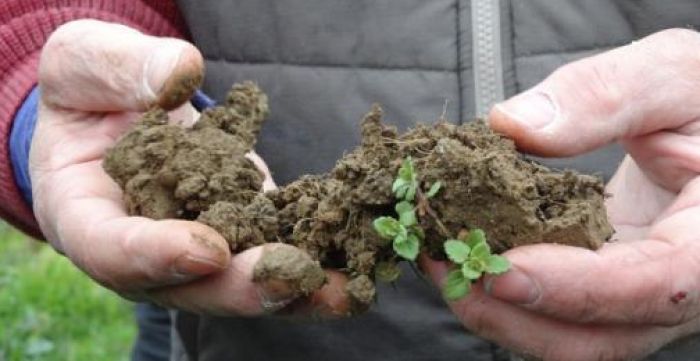
producer visit
22.11.2019
This visit to Ferme de la Sansonnière took place in February, 2013
<p><strong><em>This visit at Ferme de la Sansonnière took place in February, 2013.</em></strong></p>
<p><strong><em>Words by Jules Dressner, photos Susie Curnutte and Bonnie Crocker.</em></strong></p>
<p><img src="http://louisdressner.com/uploads/images/article/2019_Nov_22//eb/3e/eb3e49b29339ca1a0fa9b7f80cd6f88a.jpg" /></p>
<p>A former stone-mason, Mark has been at the forefront of <glossary title="160">biodynamic</glossary> <glossary title="1103">viticulture</glossary> since founding his <glossary title="427">estate</glossary> in 1990. <br />
<br />
Once the entire group had arrived, we walked over to the nearby vines. The first site we visited was <em>Fouchardes</em>, the 0.5<glossary title="523">h</glossary> <glossary title="760">parcel</glossary> that produces the <glossary title="363">cuvée</glossary> bearing the same name.<br />
<br />
<img src="http://louisdressner.com/uploads/images/article/2019_Nov_22//40/2c/402c8c0b128403e2dbe27d2c2d3256d7.jpg" /><br />
<br />
<img src="http://louisdressner.com/uploads/images/article/2019_Nov_22//9c/c5/9cc5848abd24c1609fcf2a4028db2f33.jpg" /></p>
<p>On our way over, Mark filled us in on his plans to plant five rows in <glossary title="464">franc de pied</glossary> at the edge of this <span class="zalup"><span><glossary title="760">parcel</glossary><span>.</span></span></span> <glossary title="788">Phylloxera</glossary> has a much harder time propagating itself in very poor soils, and by planting in the <glossary title="909">sandiest</glossary> area he has, Mark hopes the vines will have a fighting chance. Last time he attempted this experiment, it was in a different <span class="zalup"><span><glossary title="1133">plot</glossary><span>,</span></span></span> and the vines lasted from 1994 to 2006.<br />
<br />
With the group gathered around him, Mark began to explain the importance of the Fouchardes <glossary title="760">parcel</glossary> in the evolution of his work philosophy. </p>
<p><br />
<br />
<img src="http://louisdressner.com/uploads/images/article/2019_Nov_22//b1/26/b126028877377efcd7c4d44ebc44f843.jpg" /><br />
<br />
<em>"This field showed me how to remove the wires, but also that I should make </em><glossary title="405"><em>dry</em></glossary><em> wines."</em><br />
<br />
All of Sansonnière's vines are unwired, which is basically unheard of in cooler, northern wine growing regions. </p>
<p><img src="http://louisdressner.com/uploads/images/article/2019_Nov_22//c5/ff/c5ff104620420720a0859906b204e843.jpg" /></p>
<p>Mark feels that liberating each <glossary title="281">Chenin</glossary> <glossary title="497">gobelet</glossary> gives them more freedom and air, in turn leading to purer grapes and less rot. This discovery, coupled with the fact that producing sweet wines requires either a constant gamble with nature or manipulative techniques (<glossary title="993">sulfur</glossary> additions, <span class="zalup"><span><glossary title="447">filtration</glossary><span>.</span></span></span>..) inspired Mark to completely phase out his <glossary title="108">AOC</glossary> <glossary title="177">Bonnezeaux</glossary> production in order to favor production of <glossary title="405">dry</glossary>/<glossary term="Off-Dry" title="736">off-dry</glossary><font color="#7b143e"><strong> </strong></font><glossary title="105">Anjou</glossary> blancs and later <span class="zalup"><span><glossary term="Vin de France" title="1092">Vin de France</glossary><span>.</span></span></span><br />
<br />
Next, we talked about soil. </p>
<p><br />
<img src="http://louisdressner.com/uploads/images/article/2019_Nov_22//e7/8a/e78a3e38a52bd3ca389f97c6e4717fc5.jpg" /><br />
<br />
For <em>Fouchardes</em>, the first three rows are <glossary title="810">plowed</glossary> and the rest are mowed or lightly worked on a superficial level. For Mark, having constant grass balances the vigor of the vines. <br />
<br />
<em>"50 years ago, average </em><glossary title="1129"><em>yields</em></glossary><em> were 35<glossary term="hl/ha" title="528">hl/ha</glossary></em><em>. If you stick to those numbers in this area, you are assured quality."</em><br />
<br />
To assure this, vines are tied together at the top to limit vegetative vigor, and he <glossary title="834">prunes</glossary> very tightly to six <glossary title="1138">bunches</glossary> per vine (thanks to <a href="http://winedisorder.com/comment/56/6790/">Joe D's excellent recap of the visit</a> for that detail, which I missed). <br />
<br />
One thing everyone noticed was the large amount of worm shit everywhere.</p>
<p><img src="http://louisdressner.com/uploads/images/article/2019_Nov_22//42/93/42932ed04e670b36095d80477fb73996.jpg" /><br />
<br />
The technical term for worm poop is "castings", and Mark explained why they are such a fundamental part of healthy soils. <br />
<br />
<em>"This is a sanitary filter. If you see those (castings), you know their is no poison in the soil." </em><br />
<br />
If you aren't offended by Wikipedia links, read up on vermicompost <a href="http://en.wikipedia.org/wiki/Worm_castings">here</a>. <br />
<br />
One thing you won't find in vineyards that use heavy amounts of <glossary title="279">chemical</glossary> <span class="zalup"><span><glossary title="442">fertilizers</glossary><span>,</span></span></span> <glossary title="526">herbicides</glossary> and <span class="zalup"><span><glossary title="1142">pesticides</glossary><span>?</span></span></span><br />
<br />
<img src="http://louisdressner.com/uploads/images/article/2019_Nov_22//ee/48/ee48fee51f9508418e78db89399cb3a0.jpg" /><br />
<br />
Or grass, for that matter. <br />
<br />
As far as the soil's consistency (castings included):<br />
<br />
<em>"It must feel like couscous."</em><br />
<br />
<img src="http://louisdressner.com/uploads/images/article/2019_Nov_22//cf/5a/cf5a2c27410743bee5147d023a5dabe9.jpg" /><br />
<br />
After a good amount of time in <em>Fouchardes</em>, we continued the tour by visiting by the vines producing the "La Lune" <span class="zalup"><span><glossary title="363">cuvée</glossary><span>.</span></span></span> </p>
<p><br />
<img src="http://louisdressner.com/uploads/images/article/2019_Nov_22//6b/0f/6b0f025758c1869fdc96c50099f37000.jpg" /><br />
<br />
The vines here are 4 to 75 years old. The soils are primarily <glossary title="301">clay</glossary> and <span class="zalup"><span><glossary title="596">limestone</glossary><span>,</span></span></span> but change consistency every 30 meters, in some cases drastically. This variety of age/soils adds notable depth to the <span class="zalup"><span><glossary title="168">blend</glossary><span>.</span></span></span> <br />
<br />
<img src="http://louisdressner.com/uploads/images/article/2019_Nov_22//b2/60/b26020a83d0708ec4c6293ad2a883c7d.jpg" /><br />
<br />
At the top of the <span class="zalup"><span><glossary title="760">parcel</glossary><span>,</span></span></span> Mark's son Martial (who is now a partner at the <glossary title="427">estate</glossary>) was there with an employee, burning various wood cuttings.<br />
<br />
<img src="http://louisdressner.com/uploads/images/article/2019_Nov_22//64/3f/643fce7c4282c05a2fa8e2b513656582.jpg" /><br />
<br />
The group freaked out their dog Chicanita, who started nervously barking at us.</p>
<p><br />
<img src="http://louisdressner.com/uploads/images/article/2019_Nov_22//37/19/3719f18f926af3ddc3ab5b57653ce514.jpg" /></p>
<p>She's only a year old, and Martial explained she'd never seen such a large group of people all at once. I would be barking too if this group of note-taking hoodlums started lurking around my property:<br />
<br />
<img src="http://louisdressner.com/uploads/images/article/2019_Nov_22//5a/83/5a831481fd187c5127b7924dbb23d466.jpg" /><br />
<br />
Walking through the "La Lune" vines back to the house, Mark pointed out how free it feels to walk through vineyards without having to follow a single row. <br />
<br />
Predictably, we ended our visit checking out the <glossary title="254">cellar</glossary> and tasting wines.<br />
<br />
<img src="http://louisdressner.com/uploads/images/article/2019_Nov_22//98/f2/98f22b625d614375e4063d156ed4a741.jpg" /><br />
<br />
We tasted all the 2011's: "Les Fouchardes" was nice but showing young (Mark admits this wine needs time to develop in bottle), "La Lune<em>"</em> was excellent and the <glossary title="871">rosé</glossary> was bright, expressive and <glossary term="Off-Dry" title="736">off-dry</glossary>/veering to sweet. We also got to try a fun <glossary title="185">bottling</glossary> of <span class="zalup"><span><glossary title="513">Grolleau Noir</glossary><span>,</span></span></span> which was an unexpected, easy drinking surprise. There are only a few hundred bottles of it so I doubt any will ever make it stateside. We rounded out the lineup with a 1997 "La Lune<em>"</em> and 1997 <span class="zalup"><span><glossary title="694">Moelleux</glossary><span>,</span></span></span> both showing a similar evolution or richer, honied <span class="zalup"><span><glossary title="281">Chenin</glossary><span>.</span></span></span> <br />
<br />
The visit ended with a big chat on natural volcanic <span class="zalup"><span> <glossary title="993">sulfur</glossary><span>.</span></span></span> Sourced from Mount <glossary title="429">Etna</glossary> (with a plan B from Japan), apparently you only need to use half as much as commercial <glossary title="993">sulfur</glossary> because it does not <span class="zalup"><span><glossary title="754">oxidize</glossary><span>.</span></span></span> The stuff is loaded into this little contraption, which burns it and distributes it into the wine. </p>
<p><br />
<img src="http://louisdressner.com/uploads/images/article/2019_Nov_22//65/18/6518ab101ec5c53d0779f366e374543b.jpg" /></p>
<p>Even the <glossary title="993">sulfur</glossary> is natural now! Bazoom!<br />
<br />
Three other conversations of note during the visit:<br />
<br />
<strong>Number 1: </strong>14 <glossary title="427">estates</glossary> are now working organically in <span class="zalup"><span><glossary title="105">Anjou</glossary><span>,</span></span></span> most of which were started by young, non-locals. As a <span class="zalup"><span><glossary title="1198">Corsican</glossary><span>,</span></span></span> this new energy reminds Mark of his humble beginnings in the <span class="zalup"><span><glossary title="602">Loire</glossary><span>,</span></span></span> and it pleases him to see how much things have changed since the early 1990's.<br />
<br />
<strong>Number 2:</strong> <glossary title="746">Organics</glossary> are sweeping the nation! This year alone, 4000 <font color="#7b143e"><strong><glossary term="Hectare" title="523">hectares</glossary></strong></font> of vines are getting <glossary title="332">converted</glossary> to <glossary title="746">organics</glossary> in <span class="zalup"><span><glossary title="178">Bordeaux</glossary><span>!</span></span></span> That number is certainly nothing to scoff at, and Mark believes this is the beginning of a fundamental shift in French <glossary title="1103">viticultural</glossary> practices.<br />
<br />
<strong>Number 3:</strong> Mark's Madagascar based charity is doing great! They keep finding new sponsors, raising awareness and money, and he just signed an agreement with a french paper company to replant 150 <font color="#7b143e"><strong><glossary term="Hectare" title="523">hectares</glossary> </strong></font>of forest this year. In the long-run, Mark hopes to to replant 1000 a year!</p>
Article
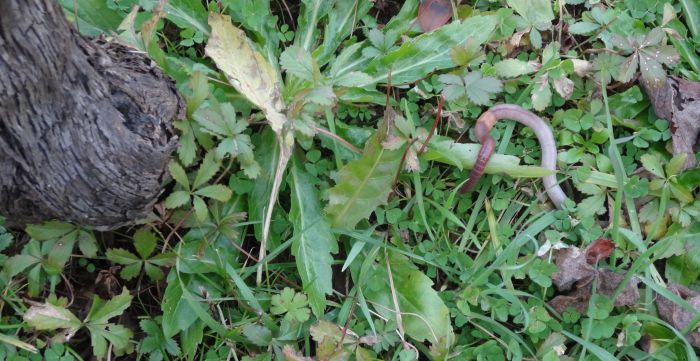
harvest report
03.10.2005
2005 Harvest Report from Mark Angeli
<p>Here we had, for the third year in a row, a Mediterranean climate with no rain for five months, trees dying, the river <glossary title="584">Layon</glossary> totally dry, the <glossary title="603">Loire</glossary> not much better. We have been reassured by being told that everything can be made right … by installing air conditioning to survive these excessive temperatures. (NT: here follows a series of advice on several devices and installations cutting out the consumption of fossil fuel, and nuclear-produced electricity.)</p>
<p>We had decided that within five years the entire <glossary title="427">estate</glossary> would be <glossary title="810">plowed</glossary> with the horse. It is done as of this year. I don’t have a big stomach any more, and we are looking, in coming years, to devise ways not to enter the vines with the tractor at all. No more noise, gas, soil compaction, only pleasure.<br />
<br />
All the vine <glossary title="328">treatments</glossary> (we did two this year, for a total of one nettle tea and one kilo and a half of <glossary title="179">bouillie bordelaise</glossary> per <span class="zalup"><span><glossary title="523">hectare</glossary><span>,</span></span></span> save 30 ares that received no <glossary title="328">treatment</glossary> whatsoever) will be done on foot and manually, like topping (NT: trimming of top leaves) that is becoming less and less necessary anyway. We’ll have to adapt a grass-cutter to be horse-drawn to clip the grass in the rows.<br />
<br />
My Vignes Françaises (NT: ungrafted vines) are suffering from <span class="zalup"><span><glossary title="788">phylloxera</glossary><span>.</span></span></span> Barring a miracle, 2006 will be my last <span class="zalup"><span><glossary title="521">harvest</glossary><span>.</span></span></span> The Vignes en Foule (NT: vines planted in a very tight fashion, without rows) look to be, for the time being, untouched.<br />
<br />
About <glossary title="871">Rosés</glossary> d’un Jour: I am so enraged by my colleagues’ and the administration’s passivity about <glossary title="871">Rosés</glossary> d’<span class="zalup"><span><glossary title="105">Anjou</glossary><span>,</span></span></span> so patently bad, actually vomitive, that I have vowed never more to present my <glossary title="871">Rosé</glossary> to receive its <glossary title="113">appellation</glossary> of origin (maybe I’ll extend this to all my wines if there is no change coming.) So I could not resist banding together with a few iconoclasts like me, who pick their red grapes over ripe to produce <glossary title="871">Rosé</glossary> <span class="zalup"><span><glossary title="694">moëlleux</glossary><span>,</span></span></span> and use the brand "Rosé d'un Jour" for all the wines.<br />
<br />
The requirements are simple: all <glossary title="1071">varietals</glossary> are allowed; the one constraint is to submit the wines to a tasting panel composed of wine retailers, restaurant buyers, private consumers and importers; the panel will accept the wines or reject them; there is no appeal system; the choice should be made according to the emotion that the wine has given the tasters. This would be only a return to the initial system of <glossary title="108">AOCs</glossary> tastings, which quickly derailed into automatic acceptance of their own wines by the winemakers themselves, the only tasters allowed to reveal their self-satisfaction. We already have 15 candidates for <glossary title="1109">vintages</glossary> 2005, all working <span class="zalup"><span><glossary title="746">organically</glossary><span>,</span></span></span> of course.</p>
Article
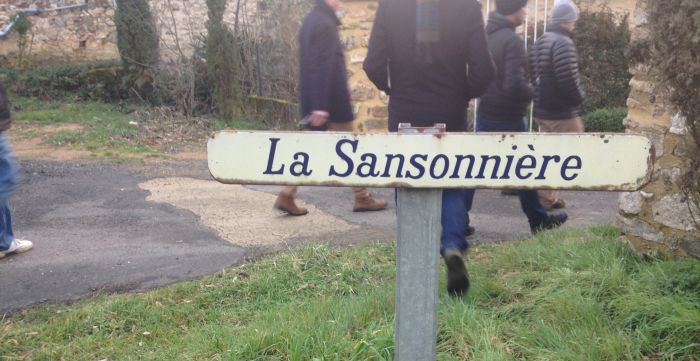
harvest report
03.10.2003
2003 Harvest Report from Mark Angeli
<p>We are starting the <glossary title="521">harvest</glossary> on September 8th. The grapes already have high levels of sugar and lower than usual acidity, which will probably mean that their <glossary title="74">aging</glossary> potential will be only average ( similar to the 1976 <glossary title="1109">vintage</glossary> which had comparable weather) for those who are not able to keep a little acidity in their <glossary title="405">dry</glossary> wines.<br />
<br />
Given all this and how quickly the grapes are ripening, it looks like there will be fewer <glossary title="1144">passes</glossary> than usual. The dessert wine grapes will essentially be sun-dried (<glossary title="763">passerillés</glossary>) with concentrated acidity which will make things very easy.<br />
<br />
We haven’t seen conditions like these in a very long time and, to tell you the truth, very few winemakers would venture to make serious predictions about the end results. Which goes to show once again that we aren’t producing Coca Cola™.<br />
<br />
<strong>Drink 2003, packed with sunshine<br />
Drink 2000, packed with rain</strong></p>
<p>A <glossary title="1109">vintage</glossary> unlike any other and probably a taste of the kind of weather our children will have to contend with on a regular basis due to the heating up of the planet.<br />
<br />
Of course, it was disconcertingly easy: very little grass to cut or hoe; 30 kilos of <glossary title="993">sulphur</glossary> and 20 kilos of <glossary title="179">Bordeaux mixture</glossary> for the seven <glossary title="523">hectares</glossary> for the whole year (this is the dose normally used by chemists for one and a half <glossary title="523">hectares</glossary> and for the last of 10 <glossary title="328">treatments</glossary>); sunny weather during the whole <glossary title="521">harvest</glossary> which lasted only 2 ½ weeks instead of the usual 2 ½ months, finishing on the day which we typically start, half the amount of <glossary title="1144">passes</glossary> in the vines, two <glossary title="827">pressings</glossary> a day which shortened a few of our nights because I just can’t bring myself to do what most of my colleagues do – that is, staying in the <glossary title="254">cellar</glossary> to do the <glossary title="827">pressing</glossary> while strangers pick their grapes. Even the serious <glossary title="1135">frost</glossary> in the spring (which diminished the crop by 40%) was made up for in part by a downpour in early September which reversed the dehydration caused by the heat wave.<br />
<br />
However, <glossary title="281">Chenin Blanc</glossary> is a semi-late <glossary title="521">harvest</glossary> <glossary title="1071">varietal</glossary> and one could certainly wonder about the intrinsic quality of grapes which ripened so quickly, especially about the finesse of the wine it will produce. We shall see.<br />
<br />
And what’s more, these kinds of <glossary title="1167">drought</glossary> conditions, if they continue, besides causing more deaths, forest fires (why do they keep replanting pine trees?), repeated flooding as soon as it rains a little bit hard, will raise the question of whether or not we can continue to make a living doing this. How is one supposed to be a breeder, a farmer or a market gardener under such conditions?<br />
<br />
<strong>New Prophesy</strong><br />
<br />
Last year’s prophetic paragraph having not surprisingly come true, I have become a repeat offender with the <glossary title="871">Rosé</glossary> d’un Jour, <span class="zalup"><span><glossary title="1006">vin de table</glossary><span>,</span></span></span> while waiting for my colleagues to adjust their tastebuds and remember the true tradition of <glossary title="105">Anjou</glossary> <glossary title="871">Rosé</glossary> by uncorking a bottle of their grandfather’s wine.<br />
<br />
At the time of writing, my Waterford crystal ball tells me that at the end of the year, we will get a new generation of nuclear power plants along with a measly sprinkling of an assortment of other renewable energy sources to help swallow the (iodine) pill. It is, however, of the utmost importance that each one of us, as soon as the law is passed, install either a windmill, solar panels or something else in order to undermine the absurd political arguments like “We need more, the only thing we can do is build more nuclear plants”. Windmills cost nothing to run and pay for themselves.<br />
<br />
<strong>Tasty and revealing episode</strong><br />
<br />
A new young and talented winemaker from <glossary title="105">Anjou</glossary> who I will recommend to you next year, Cyril Le Moing, while visiting the former owner of his vines mentioned that he was going to treat his vines with <glossary title="993">sulphur</glossary> because he had noticed a little <span class="zalup"><span><glossary title="737">oïdium</glossary><span>.</span></span></span> In a paternal and benevolent manner, this other responded by saying, “Good for you, kid, I always went heavy on the fungicides, just to be sure, …except in my own garden, that is. There, its not the same, you know, there it’s me whose going to eat the crop. “<br />
<br />
Not much honey again this year. The extreme heat forced the bees to ventilate the hive in order to keep it at 38 C degrees. And in the meantime….<br />
<br />
No apple juice at all because of the <span class="zalup"><span><glossary title="1135">frost</glossary><span>.</span></span></span> If you have to get some, you can order it directly from Iris François.<br />
<br />
<br />
<strong>Recommended winemakers:</strong><br />
Jean-Christophe Garnier in St. Lambert du Lattay<br />
Cyril Fhal at the Tour de France<br />
<br />
<strong>Recommended records:</strong><br />
De Dannan – Ballroom – Keltia Musique<br />
Hank Jones/ Tommy Flonagan – I’m all smiles – MPS<br />
Pierre Desproges – Any of his records, they’re all good.</p>
Article
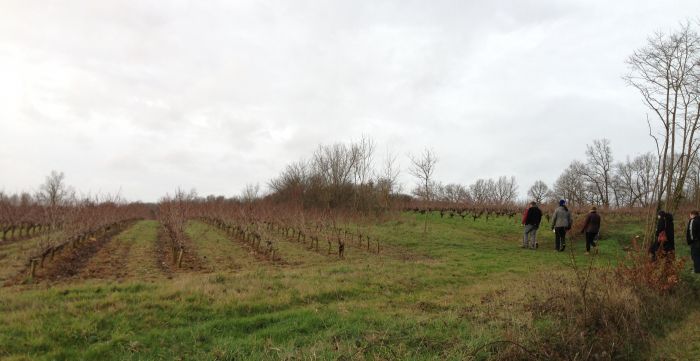
harvest report
03.10.2002
2002 Harvest Report from Mark Angeli
<p>With <glossary title="1129">yields</glossary> kept between 30 and 35 <span class="zalup"><span> <glossary title="528">hl/ha</glossary><span>,</span></span></span> whatever the climatic conditions of the year, we are sure that our grapes will <glossary title="639">mature</glossary> under good conditions.<br />
<br />
Thus, for us, the notion of <glossary title="1109">vintage</glossary> is no longer an issue of quality per se, but a context in which to make a wine that is different, which distinguishes itself from wines made in previous years. We even think that it is safe to say, as early as now, that the <glossary title="871">Rosé</glossary> d’<glossary title="105">Anjou</glossary> “<glossary title="345">Côteau</glossary> du Houet” will from now on be better than previous <span class="zalup"><span><glossary title="1109">vintages</glossary><span>,</span></span></span> which would not be possible if we did not practice quality control through limiting <span class="zalup"><span><glossary title="1129">yields</glossary><span>.</span></span></span><br />
<br />
The improvement in quality will only be due to a technical choice: pure <glossary title="513">Grolleau Gris</glossary> instead of a <glossary title="168">blend</glossary> with <glossary title="478">Gamay</glossary> and <span class="zalup"><span><glossary title="217">Cabernet</glossary><span>.</span></span></span><br />
<br />
You can therefore recognize a serious winemaker by counting the <glossary title="1124">clusters</glossary> on the vine. Five large <glossary title="1138">clusters</glossary> > eight medium-sized <glossary title="1138">clusters</glossary> > 12 small <span class="zalup"><span><glossary title="1138">clusters</glossary><span>.</span></span></span></p>
Article












